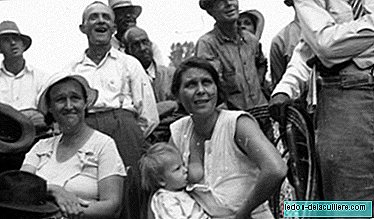
The news has jumped to the media today that the Association of Pediatric Nurses of Catalonia has detected that many women suffer from malnutrition and for that reason they do not have enough milk to breastfeed their children, so it is recommended to include artificial milk in the banks of foods. Is that really a valid reason for women not having enough milk?
Nonsense of this caliber deserves a strong response from, for example, the Breastfeeding Committee of the Spanish Association of Pediatrics, and I hope that a statement clarifying the reality will be published soon.
I have not found any scientific data that supports the claim that women with poor nutrition have less milk or worse quality, rather the opposite, because the body of the pregnant and nursing woman directs its resources to the survival of the child.
Breastfeeding in mammals is a perfectly regulated mechanism naturally and among the few reasons that produce true medically confirmable hypolactia is not poor nutrition. Yes a woman could not produce enough milk due to malnutrition we would encounter a severe case of malnutrition that would need even hospital treatment. Eating poorly does not produce less milk, there is not a single scientific fact that supports this claim and also, the experience with malnourished women in underdeveloped countries indicates it. And precisely in times of crisis, the best option is to invest in breastfeeding support policies.
In cases of famine and catastrophes, the advice is for women to breastfeed frequently as this is what guarantees more survival and lower rates of child morbidity. A woman in poor nutritional conditions can produce milk and the composition of this does not lose nutrients if we are not, as I said, with extreme cases.
Which are the real reasons why western women don't breastfeed or don't have "enough milk"?
Not sleep with the baby
The descolecho, a very recent and circumscribed practice to the western countries. In the rest of the world and history the women have slept with their children, just as our primate relatives do. Colecho is a great ally of breastfeeding: it increases and facilitates feeding and we all know that milk production is a mechanism of supply and demand.
Not sleeping with the baby and not offering his chest at night if he does not cry to ask for it from another room causes the shots to decrease, with the consequent loss of nocturnal tits brings a decrease in prolactin that reaches higher peaks at night. Successful breastfeeding can be achieved without sleeping with the baby, but an unnatural, purely cultural difficulty is added, which, in the long run, usually leads to a shorter duration of breastfeeding and a decrease in production.
Impediments to free chest access
Humans, as primates, belong to the type of mammal that produces milk with a lower concentration of nutrients and makes continuous feeding necessary. The monkeys always carry their young in their arms and they have free and continuous access to the chest. Do not count the shots and breastfeed. They don't count time, and they nurse. They do not have to prepare the shot, simply their young is hooked when they want and thus naturally regulates the composition and amount of milk they drink.
By avoiding free access to the breast and putting impediments to the skin with skin that stimulates the baby so that breast is deprived of that mechanism that is the natural way in which breastfeeding is regulated in primates. Less shots, less production. As simple as that.
Bad advice from outdated or culturally induced professionals
We all know that there are great health professionals who really support breastfeeding and have a deep training that makes their advice appropriate.
However, there are still many professionals who are outdated or give bad information for purely cultural issues. Rarely does a health worker take the time to observe a tetada, they really know the causes and solutions to the problems that hinder breastfeeding and can give erroneous instructions end up hindering their normal development.
The separation of the baby from the mother by wrong hospital protocols and the use of bottles in the first hours of life of the newborn are factors of the health organization that are at the base of many failed or difficult lactations. The baby is born in a state of maximum alert and becomes hooked only to the breast, if left.
The consequence of the poor updating of health professionals is the abandonment of mothers prematurely (sooner than they would wish) due to a decrease in production due to a lower number of shots or shortening of these, poor posture, cracks, mastitis, braces and introduction of accessories.
Lack of contact with women who breastfeed
Human breastfeeding is an instinctive process but cultural factors of learning also have an enormous weight. It has been found that captive primates have trouble breastfeeding if they have not seen other females of the species do so. Lack of contact with women who breastfeed It is a key factor in breastfeeding failure.
In addition, in humans, emotional support and resolution of doubts, observation and normalization of breastfeeding are essential for women to reach breastfeeding wisely about this process and to solve problems. Hence the enormous role that support groups have since family and social contact networks have deprived girls and women of practical and experiential information about breastfeeding.
The ideology of "capitalist feminism"
Feminism, liberating movement of the human being and defender of women's rights, has come to derive, in some cases, in a feminist-capitalist or nihilist ideology It even denies the vital importance of maternal, contact and breastfeeding, taking it as a nuisance that prevents women from joining their role as an equal worker.
Badly this way, fortunately other feminisms know how to incorporate the rights of mothers and babies to their struggle and demand conciliation measures and support for the care and nutrition function of the woman-mother. A woman who does not wish to breastfeed or wants to end her breastfeeding is free to do so, but noting that raising is detrimental to her work development or her personal freedom is extremely dangerous.
Commercial pressures that have made the "bottle culture" credible
Although in recent years the protection of breastfeeding and the explanation of the side effects of artificial lactation has increased during the last century bottle culture He did enormous damage with advertising campaigns that damaged the confidence of mothers and health workers, presenting the invaluable help provided by having adequate food for children who cannot have breast milk as an alternative of equal (or even better) properties. Reversing this damage is a long process, as it clashes with the emotions of women who do not breastfeed for whatever reason.
Labor policies against breastfeeding
Simply labor policies are enemies of breastfeeding. The World Health Organization recommends exclusive breastfeeding during the first six months of the baby's life. Working mothers must join their position before and also separate many hours from their children. Consequence: abandonment of breastfeeding in a large number of cases due to decreased production or confusion of the baby and poor information on how to reconcile work and breastfeeding in these complicated circumstances.
Poor nutrition for mothers due to the crisis
No, that is false. The nutritional profile of milk does not change due to a poor diet of the mother. You don't have less milk either. And if there were any cases so severe that malnutrition affected milk, the mother would need medical treatment. In any case, if the quality of the milk is concerned about poor nutrition, the logical and correct way to protect children is to improve the mothers' diet, not to buy canned milk for food banks.
I will continue investigating to see if they have analyzed the composition of the milk of these malnourished women or if there is any scientific study that supports this claim and I will speak with specialists in this area so that it becomes clear when a woman with poor nutrition produces less milk or less quality And tomorrow, Armando is going to talk to us about whether a woman with poor nutrition can breastfeed or give artificial milk.












